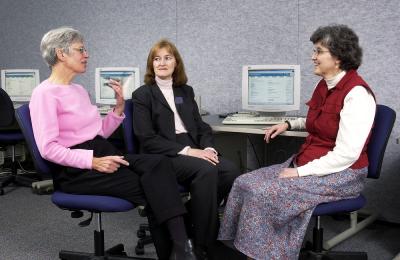December 5, 2002
Easy entry point for grantseekers
“We know that people are waking up at 2 a.m. worrying about how to find grant funding,” says Dr. Janet Rasey, director of the Research Funding Service and professor of radiation oncology. “I hear this from people in all the workshops I teach, and for many of them there are good reasons to worry. For junior faculty members, the ability to attract research funding can make or break careers.”
Yet there’s little formal training available in grantwriting or finding sources of funding—researchers have degrees in medicine or in the basic sciences and lots of specialized training in the techniques of their field, but often don’t even realize they will need skills in grantmanship until they are on the brink of trying to set up their own projects.
This fall, the service launched a revamped Web site that makes it easier than ever to take advantage of the expertise and advice accumulated by the RFS staff. The site is at http://healthlinks.washington.edu/rfs/
Rasey is the founding director of the Research Funding Service, a joint project of the School of Medicine’s Office of Research and Graduate Education and the Health Sciences Libraries. She and Dr. Karen Holbrook, then an associate dean in the School of Medicine and now president of Ohio State University, conceived the plan in 1988 and approached Dr. Sherrilynne Fuller, director of Health Sciences Libraries. Although Rasey has now retired from her research work in radiation oncology, she continues to direct the RFS and teach workshops. Services are available to all faculty, students and staff in the health sciences schools.
“The Research Funding Service is an important element of the support the School of Medicine provides for faculty, especially new faculty. We think the new Web site makes these services even more valuable and accessible,” notes Dr. Albert Berger, current associate dean for research and graduate education.
Martha Means, research consultant and the primary manager for the Web site revamping, notes that the site is intended to augment, not replace, consultations with the RFS staff, grantwriting workshops, and the Grant$ for Lunch programs that introduce topics of interest. The staff also make presentations to groups such as new faculty.
“One of the big advantages of the site is that people can use it whenever they have time, and we can use it to direct people to explore certain specific resources. What we heard from people was that our former site offered so much information that it was almost overwhelming if they didn’t know what they were looking for, so in the new format we’ve tried to keep the homepage clean and simple to provide clear pathways,” she says.
One popular feature of the site is the section on “What’s Hot,” frequently updated with fresh items and new tips. Many regular users go directly there to catch up and see developments that may affect their area of research. Military funding is now considered “hot,” largely because more has been available during the last year and some of this is for life sciences work, such as bioterrorism protection. This section also includes a FAQ (frequently asked questions) page especially for beginners, based on the experience of the staff.
Beginners will also find the “Getting Started” page very helpful. “This is one of the ways we have really tried to become more accessible to people who aren’t familiar with funding sources or with our services,” Means notes.
Another popular and frequently visited part of the site is the Funding Bulletin, produced monthly by Ramona Hensrude, funding consultant, in both paper and Web versions.
The UW’s own grant-approval process can prove to be a daunting obstacle for many beginners, the consultants say, and the site has both instructions and resources to help clarify the process.
A section on career development was added when the new site was developed.
“One of the things we’ve realized, over years of counseling postdoctoral trainees and junior faculty members, is that many people who come to us start out with questions about funding, but are concerned about broader career development questions,” says Rasey, the RFS director. The new site pulls together resources and suggested reading on developing research careers in a way that the staff believes is unique among university resource sites.
But even with all the new and revamped Web information, Ramona and Martha, who are full-time employees and usually in the office, are happy to have people make appointments to talk with them. The office is inside the Health Sciences Library in T-311, to the right of the Library’s third-floor entrance. Or call them at 685-8036.



